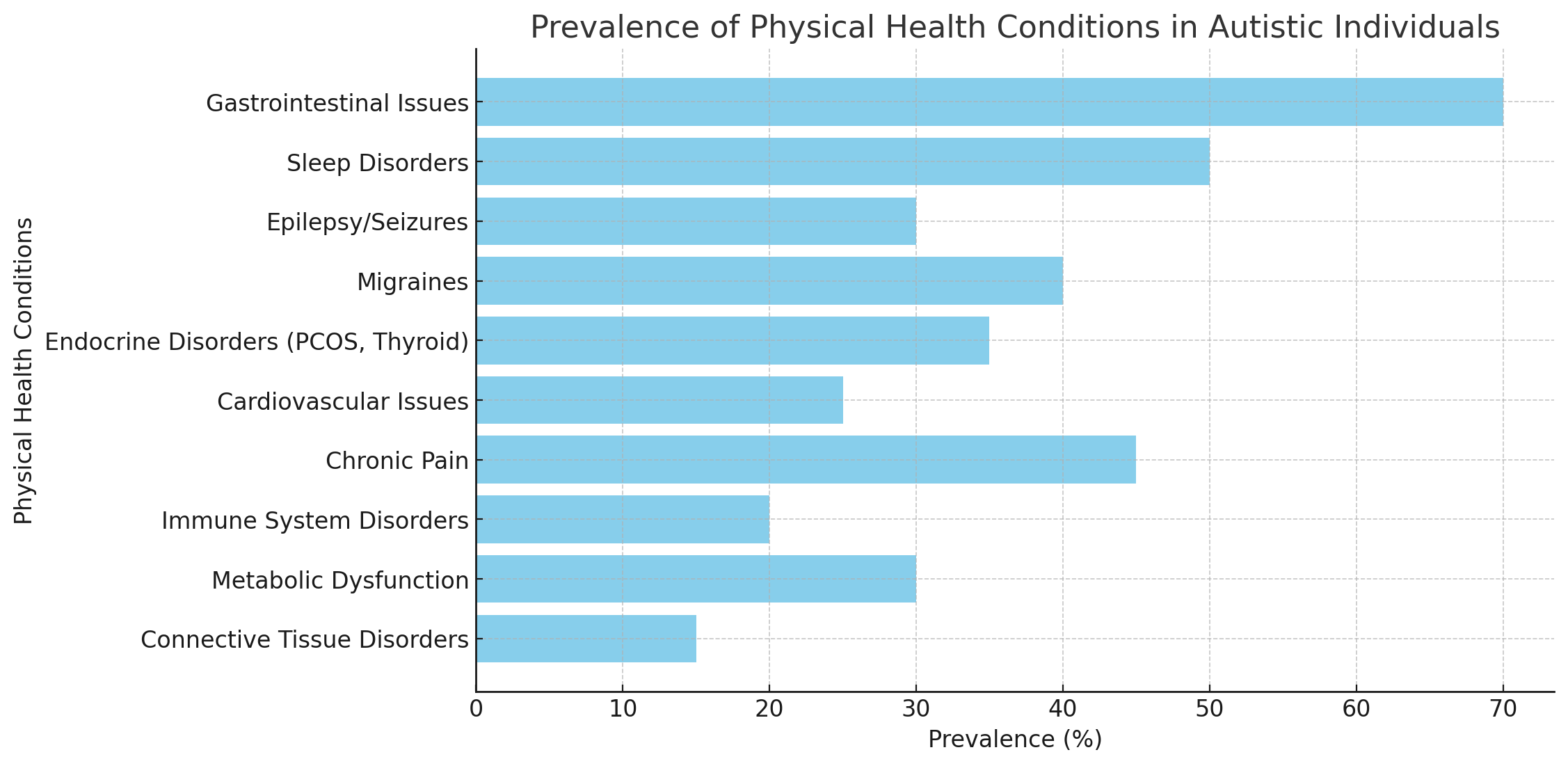Autism and Health: The Unspoken Battles Beyond the Brain
Disclaimer: Article written based on research & lived experiences as an AuDHD woman. Experiencing the physical health issues mentioned below does not necessarily indicate autism. However, research suggests that autistic individuals are more prone to these health concerns compared to the general population.
Beyond the Stereotypes: A Wider Range of Health Vulnerabilities

Reflecting on our first “Neurodiversity Stories from India” series, one recurring theme became painfully clear: long-term physical health conditions persisting into adulthood are all too common for individuals with diagnosed or undiagnosed autism. These challenges aren’t isolated to the realm of mental health alone—they extend into every corner of our physical well-being. In my own journey and in the stories shared by many in our community, the reality is that the physical toll of neurodivergence can often be as debilitating as the cognitive or behavioral aspects. Today, we delve into the hidden health risks that many autistic individuals face—risks that have been largely overlooked until now.

One of the most alarming findings emerging from recent research is the increased incidence of unexplained heart attacks in young men. Traditionally, cardiovascular issues were not a focal point in autism studies, but new evidence is challenging this long-held assumption.
Case Study Example:
A published case study described a 29-year-old autistic man who, despite having no traditional risk factors such as obesity, diabetes, or a family history of heart disease, suffered a sudden heart attack during an MRI scan. Medical evaluations ruled out the common causes, prompting researchers to explore alternative explanations. They noted that chronic stress, metabolic irregularities, and an altered autonomic nervous system—factors sometimes linked to neurodivergence—might contribute to such unexpected cardiac events. This case highlights the urgent need to reexamine how autism can affect cardiovascular health, even in young individuals.

For autistic –diagnosed or undiagnosed– women, the challenges extend deeply into reproductive and hormonal health. It has become increasingly clear that many autistic women experience endocrine issues that significantly affect their overall well-being. Conditions such as polycystic ovary syndrome (PCOS), thyroid disorders, and broader metabolic imbalances are more common than once believed.
Case Study Example:
Consider the case of a 27-year-old autistic woman who long battled unexplained fatigue, irregular menstrual cycles, and significant weight fluctuations. Despite consulting multiple specialists, her symptoms were initially dismissed as stress or lifestyle issues. Eventually, she was diagnosed with PCOS and thyroid dysfunction. Her experience is not isolated—several case studies now document similar patterns among autistic women, suggesting that the interplay between autism and hormonal imbalances is a critical area that demands further research. These endocrine challenges compromise not only physical health but also energy levels, mood regulation, and overall quality of life.
Apart from these there are additional physical health related complexities that autistic individuals can face. These conditions further illustrate the systemic impact of autism on the body. Few other physical health related complexities can comprise of the following:-
• Immune System Irregularities: Increased susceptibility to autoimmune conditions and chronic inflammatory responses.
• Sleep Disturbances: Beyond common sleep problems, many autistic individuals struggle with circadian rhythm disruptions and insomnia.
• Digestive Disorders: Conditions such as irritable bowel syndrome (IBS), gastroesophageal reflux disease (GERD), and other gastrointestinal sensitivities beyond coeliac disease.
• Musculoskeletal Issues: Chronic joint pain, hypermobility, or fibromyalgia that may arise from differences in muscle tone or movement coordination.
• Sensory-Related Conditions: Persistent auditory or visual sensitivities that can lead to headaches, eye strain, or even vestibular issues.
• Dental and Oral Health Challenges: Increased risks for dental problems, possibly due to sensory aversions to dental care or difficulties maintaining routine oral hygiene.
• Chronic Fatigue and Pain Syndromes: Unexplained chronic fatigue and pain disorders that may overlap with other health issues.
• Skin Conditions: Higher incidence of eczema, psoriasis, or other dermatological concerns potentially linked to immune dysregulation.
A Personal Journey Through Hidden Health Challenges

My personal experience offers a glimpse into how these complex health issues manifest from a young age. 4 years after being hospitalised for mobility loss & recovery, at the age of 8, I was diagnosed with migraines. Doctors prescribed Vasograin to manage the severe headaches and the constant, overwhelming ringing in my ears. However, I discontinued the medicines when I learnt to control my pain. I have never been comfortable relying on allopathic medicine unless it was the last option available—nor was my family, considering the lasting side effects it can have.
I also vividly recall my mother preparing a traditional remedy—a mixture of camphor and mustard oil, cooked together and left to rest for a few days before use—that she would often massage onto me whenever I experienced severe body aches, a common occurrence in my childhood. This home made blend not only helped alleviate a significant amount of physical pain but also played a crucial role when I lost my ability to walk.
The combination of these massages and my persistent efforts to practice walking eventually helped me regain my mobility. Alongside my mother’s massages, I also underwent physiotherapy for three months, but the natural, hands-on approach resonated with me far more than any of the injections and pills prescribed at the hospital ever could.
My parents, who are also undiagnosed neurodivergent individuals (a discovery made after my diagnosis), have always preferred herbal, Ayurvedic, and homeopathic treatments over allopathic solutions. My father, who appears to be on a similar spectrum as myself, once suffered from severe gastrointestinal problems and was even hospitalised due to the severity of his unexplained stomach ulcers—just one example of the many physical health issues that can arise.
Later, at the age of 12, I was diagnosed with a thyroid disorder. This diagnosis came at a time when such conditions in someone so young made little sense. Yet, the doctors did not even consider investigating an underlying cause—such as neurodivergence—that might explain these early-onset endocrine issues. In India, mainstream medicine often overlooks the possibility that neurodivergence might be the root cause of these physical challenges, opting instead to simply prescribe medications to manage symptoms.
Tip : Proper diet planned according to individual requirements & exercises can significantly help cope with a lot of these above mentioned problems.
Rethinking Autism and Health
These personal experiences, along with emerging case studies, highlight a crucial reality: the physical health challenges associated with autism are far more complex and widespread than previously recognised. Yet, outdated medical and psychological frameworks—ones that fail to consider sensory processing, metabolic dysfunction, and hormonal imbalances—continue to limit the ability of professionals to provide truly effective care.
It is time for medicine and psychology to evolve beyond narrow perspectives on neurodiversity. This means updating curricula, integrating modern research, and, most importantly, valuing the lived experiences of neurodiverse individuals. A more informed and holistic approach is essential to ensuring that neurodivergent individuals receive the support they truly need.
Have you ever faced a health challenge that doctors struggled to explain? Have you experienced symptoms that seemed to have no clear cause? Let’s start a conversation about these overlooked realities—because understanding them is the first step toward real change.
Research Articles for reference:- Autism & Cardiometabolic Disease Often Go Hand in Hand.
Chronic Physical Illness Across All Organ System in Autistic Individuals.
Comments
Post a Comment